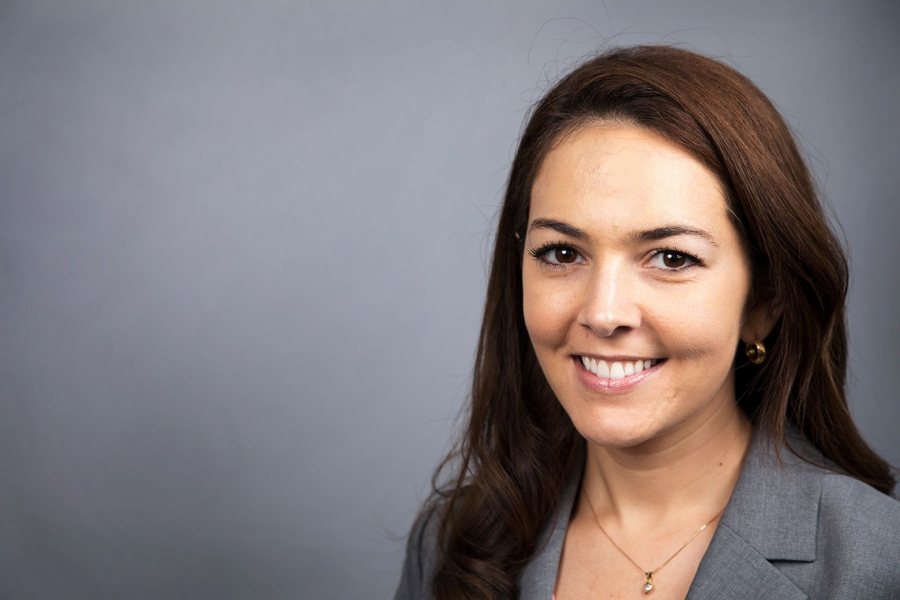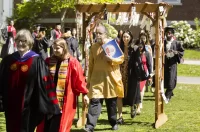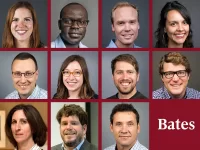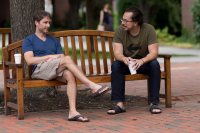
Among the 10 tenure-track faculty and Mellon Diversity and Faculty Renewal Fellows joining Bates this year are a cell biologist focusing on neurobiology, a philosopher who critiques research into cognition, an economist focused on development in Africa, and a scholar of Renaissance English and Spanish literature.
Part of a high tide of faculty hires, they’ve arrived with impressive research and thoughtful teaching philosophies, a desire to bring students into their scholarship, and the excitement of working in a liberal-arts environment at Bates.
Click their titles below to meet them.
+Andrew Baker, Lecturer in History, and Mellon Diversity and Faculty Renewal Postdoctoral Fellow
Name: Andrew Baker
Position: Lecturer in History, and Mellon Diversity and Faculty Renewal Postdoctoral Fellow*
Degrees from: Harvard University, Ph.D. and A.M.
Yale University, A.B.
His work: Baker’s focus as a historian is 19th-century America, notably the South during the Civil War and its aftermath, including Reconstruction and the advent of Jim Crow. Specifically, he researches New Orleans around the end of the 19th century. As a child Baker was fascinated by the Civil War; now, he says, “I’ve become more interested in how the tensions that created the Civil War were so fundamentally unresolved by the conflict.”
What he loves about his work: “The great thing about history is that there are so many pieces of evidence that you can use to construct stories and figure out what your characters were thinking, what they were doing, what they were feeling. As a historian, I enjoy that ability to think about characters, and how they fit together in communities, and how communities become countries.”
Why teach? “My experience as an undergrad was one of trying to find myself. I want to pay back the people who opened my mind, taught me how to read in ways that I didn’t know when I started. Teaching is a great opportunity to do that — to point students in directions that might be exciting for them and might give them a new way of thinking about the world.”
Why Bates? “Bates has always been a place that has tried to figure out the right thing to do. With regard to gender, race — these kinds of key social issues — Bates has been ahead of its time. To me, being on the right side of history is about as good as it gets from an institutional standpoint.”
*Mellon Diversity and Faculty Renewal Postdoctoral Fellows become tenure-track assistant professors in their second year at Bates.
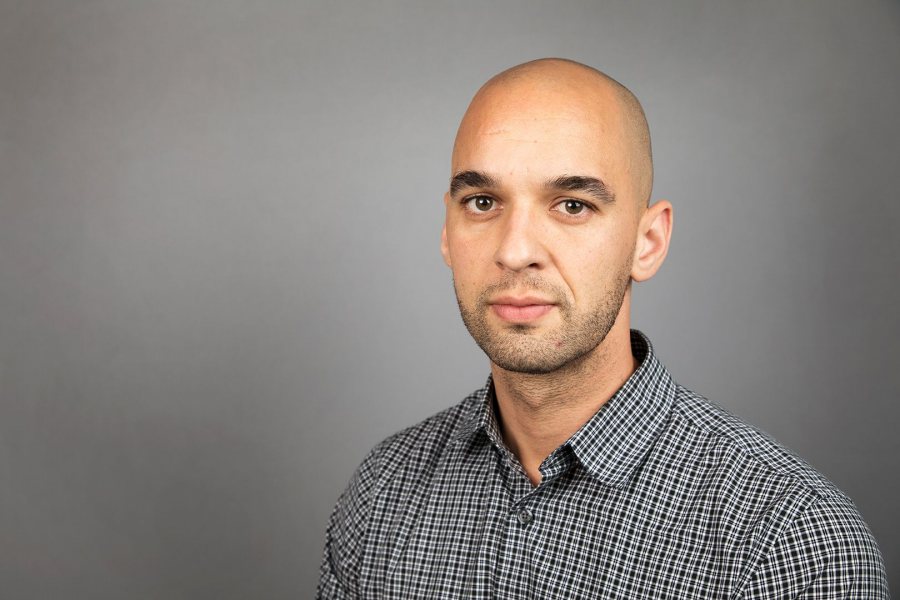
A lecturer in history and a Mellon Diversity and Faculty Renewal Postdoctoral Fellow, Andrew Baker says that “with regard to gender, race — these kinds of key social issues — Bates has been ahead of its time.” (Theophil Syslo/Bates College)
+Luke Chicoine, Assistant Professor of Economics
Name: Luke Chicoine
Position: Assistant Professor of Economics
Degrees from: University of Notre Dame, Ph.D. and M.A.
University of Washington, B.S.
Before Bates: DePaul University, Assistant Professor of Economics
His work: Chicoine works in development economics, focusing on issues relating to healthcare and accumulation of human capital in sub-Saharan Africa. A major focus is on evaluating the long-term effectiveness of education reforms that have helped move millions of children into classrooms. Chicoine’s field work includes a project in Uganda that was recently accepted by the journal World Development: Unpredictable staff attendance at many public clinics makes the decision to seek healthcare, which often means walking to the local clinic, increasingly costly. Chicoine’s project worked with local staff to text-message members of the community when clinic services were available. This measure increased the use of healthcare services and reduced illness.
Finding his path: Chicoine started out wanting to “improve living standards for the very poorest,” he says. “As an undergraduate I wanted to work with an international development organization; I spent much of my time in college exploring which disciplines provided the necessary skills. I came to the conclusion that I needed to learn the analytical tools to differentiate between what’s working and what’s not, and I realized that economics was the path I wanted to follow.”
Why study economics? “Economics is the study of people and why they make the decisions that they do,” Chicoine says. “In economics, we view each decision as a rational trade-off between costs and benefits, and we use economic frameworks to understand the incentives that lead to the outcomes witnessed in our often confusing world.” For non-majors, he adds, economics affords “a tool set for analyzing decisions that you can apply to any topic.”
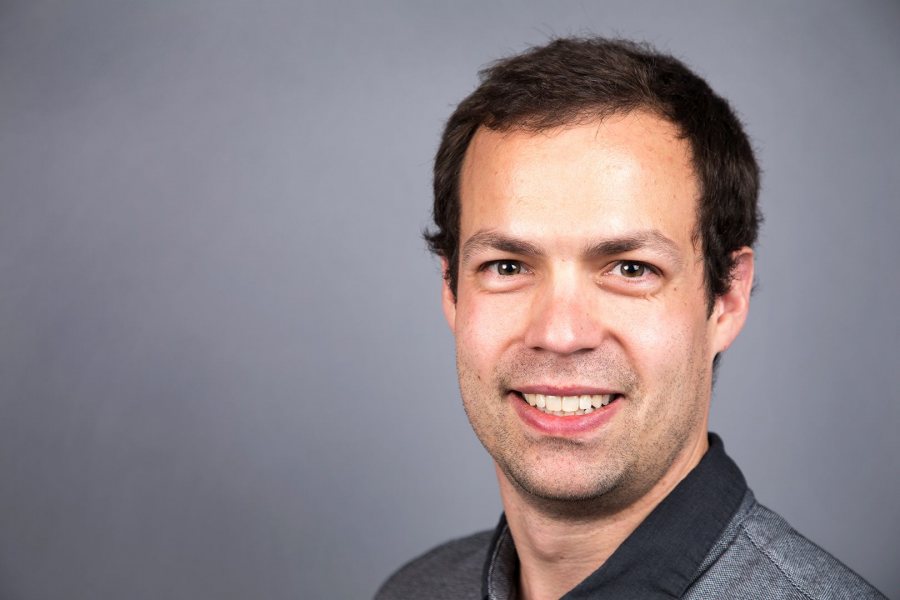
Luke Chicoine, assistant professor of economics, focuses on issues relating to healthcare and accumulation of human capital in Africa. (Theophil Syslo/Bates College)
+Michael Dacey, Assistant Professor of Philosophy
Name: Michael Dacey
Position: Assistant Professor of Philosophy
Degrees from: Washington University in St. Louis, Ph.D. and M.A.
Wesleyan University, B.A.
Before Bates: Colby College, Faculty Fellow in Philosophy
His work: The philosophy of science scrutinizes the purposes and methods of science, and Dacey applies those concerns to cognitive science. He studies the relationships among the several disciplines that inform the field, with a particular interest in research involving non-human animals.
Dacey also examines the conceptual foundations for scientific inferences, “trying to figure out what inferences from an experiment are actually legitimate and which ones aren’t.” He has studied the implications of such thought habits as anthropomorphism, mental associations, and parsimony, or the principle that the simplest explanation for a phenomenon is likely correct. “Can we come up with a story about why the simpler theory is actually better?”
Finding his path: Setting out to major in physics, Dacey found himself waylaid by philosophy — yet physical science remained compelling. “I just like to figure out how things work,” he says. “That means staying tied to the concrete ideas that you get from looking at exactly what the studies are doing, and whether the discussion section actually follows from what happened in the methods section.”
Why study philosophy? Like the liberal arts education itself, philosophy teaches reasoning and close attention to text. And, Dacey says, “Many of the questions discussed in philosophy are important things for people to be able to think about a bit from time to time.”
Why Bates: “The philosophy department here is fantastic. Extremely nice, very dedicated to what they do, excellent philosophers.” Dacey notes, “My classes are basically full — new courses taught by a new person.” That level of interest in philosophy “is a testament to the strength of the Bates philosophy department.”
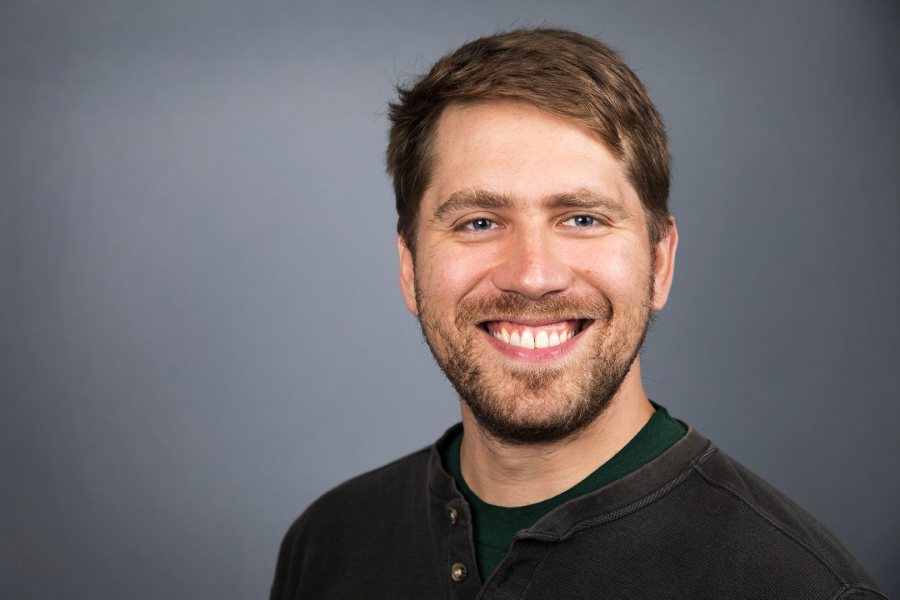
Michael Dacey, assistant professor of philosophy, scrutinizes the purposes and methods of cognitive science. (Theophil Syslo/Bates College)
+Timothy Dugan, Assistant Professor of Theater
Name: Timothy Dugan
Position: Assistant Professor of Theater
Degrees from: Temple University, M.F.A.
Union College, M.A.T.
State University of New York at Oswego, B.A
Before Bates: The University of the Arts, Senior Lecturer
Temple University, Adjunct Professor
His work: A member of Actors’ Equity and SAG-AFTRA, Dugan is an actor and director who teaches both disciplines. His acting credits include a long list of stage roles across a broad range of genres, and he just finished his 11th season at the five-week summertime Saratoga Shakespeare Company, where he is associate artistic director and education director.
Finding his path: Dugan discovered theater in his junior year in a playwriting class taught at Oswego by Brad Korbesmeyer. “He just illuminated this world of theater, and I found myself totally knocked out by it. That started my path to where I am today. And I am still friends with him.”
What he loves about the work: “Theater aligns itself wonderfully to the liberal arts, because what we do all the time is to ask what it means to be human,” Dugan says. “In the work, I discover a lot about myself — areas in which I flourish, areas in which I’m afraid, habits that rear up. I started being really curious about all this discovery because it’s an ongoing process.”
Why study theater? Trained in the Stanislavski method, Dugan sees a role for Stanislavski’s “magic if” in the liberal arts education. Actors learn to ask themselves what they’d do if they were in their characters’ circumstances: That cultivates a capacity for empathy that enriches all manner of interactions.
In addition, he says, theater gives students “the ability to communicate in public and the ability to collaborate,” he says. “Those skills are invaluable — certainly in the 21st-century skill set.”
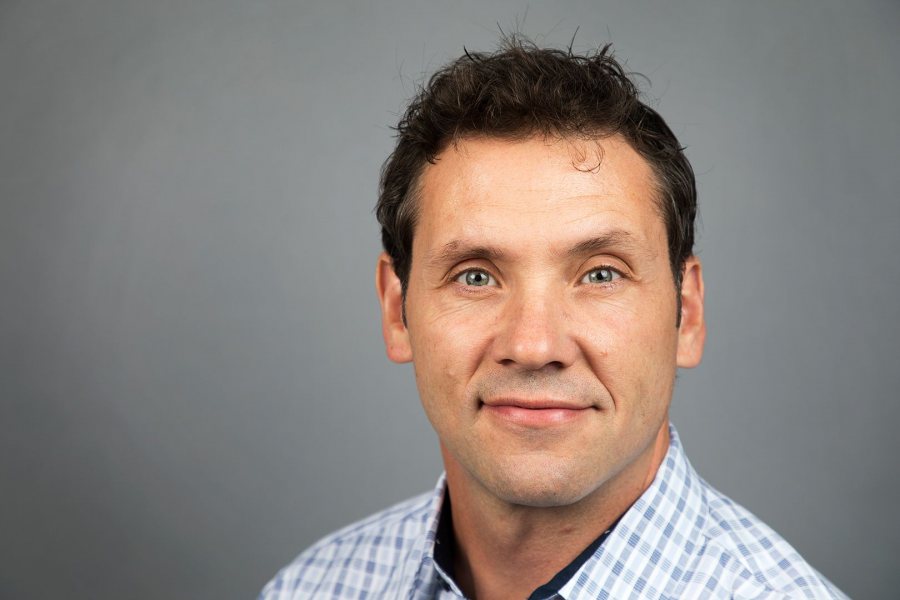
Assistant Professor Theater Timothy Dugan is also associate artistic director and director of education at the Saratoga Shakespeare Company. (Theophil Syslo/Bates College)
+Michelle Greene, Assistant Professor of Neuroscience
Name: Michelle Greene
Position: Assistant Professor of Neuroscience
Degrees from: Massachusetts Institute of Technology, Ph.D
University of Southern California, B.S
Before Bates: Stanford University, Department of Computer Science, Research Scientist
Her work: Greene researches human vision. Specifically, she studies how we perceive scenes, as opposed to smaller components of an image, and she then seeks to synthesize her research findings through mathematical modeling.
Tell us more: Greene takes a three-pronged approach to the work. Tracking the eye movements of human subjects as they view test imagery on monitors, she makes psychophysical measurements — as she puts it, “the limits of what people can perceive,” in terms of factors like contrast, color values, and particularly the length of time needed to perceive an image. Second, with an EEG, she measures brain activity in relation to the vision tests. With the third element, the mathematical modeling, she takes “what we’ve learned in both the behavior and the brain, and tries to synthesize it, explain it, and predict future behavior.”
Why teach? One reason involves ways to do good in the world, Greene says. At a place like Bates “you get to really engage with the students in a more one-on-one setting; you touch hundreds of lives over the course of a career; and you have the chance to teach them how to think, how to be critical of the information in their lives.”
How does she teach? Working in a field that studies how the brain handles information, Greene says that “there’s a lot of data on how to learn better. A lot of it comes down to very simple things: getting your hands into it, manipulating real data, doing real problem sets. I’m particularly attracted to the smaller classes at Bates because we can do that in a very honest way.”
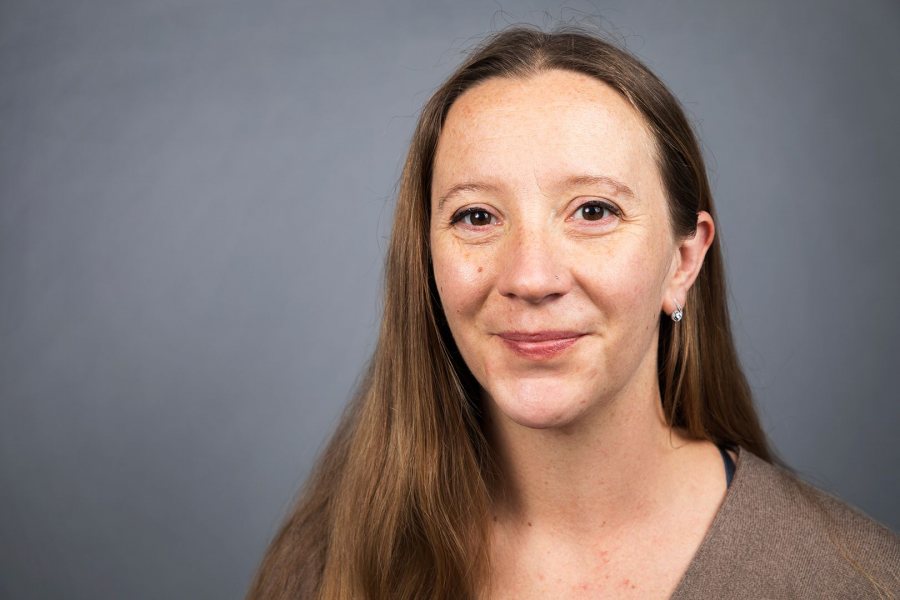
Equipped with a new lab in Hathorn Hall, Assistant Professor of Neuroscience Michelle Greene studies visual perception. (Theophil Syslo/Bates College)
+Martin Kruse, Assistant Professor of Biology and Neuroscience
Name: Martin Kruse
Position: Assistant Professor of Biology and Neuroscience
Degrees from: University of Hamburg, Germany, Ph.D. and Diploma (equivalent to B.S. and M.S.)
Before Bates: University of Washington, Department of Physiology and Biophysics, Acting Instructor
His work: Kruse describes himself as “a cell biologist with a very strong interest in neurobiology.” Broadly interested in processes that control the activity of nerve cells, he focuses on the role of lipids and specifically phosphoinositides — a small family of lipids with a disproportionately large influence on nerve cellular activity. “Using biochemical and cell biological methods, I try to understand how the lipids regulate nerve cells, and how the levels of the lipids themselves are regulated.”
Students in the lab: Three thesis students are participating in Kruse’s research this academic year. One will use a patch clamp amplifier to record how cellular electrical activity changes as lipid levels are altered. The other students will focus on cell lines useful in the research: One student will work with Kruse on a line developed at the Salk Institute for Biological Studies in San Diego, and the other, using the genome editing technology called CRISPR/Cas9, will help develop a whole new line.
Why Bates? “I was immediately intrigued by the strong collaborative aspect between all the faculty and the different disciplines,” he says. “And the strong focus that Bates puts on both research and teaching is extremely valuable and interesting for me. It is expected that you are extremely good at both, but you are also given such a wealth of support to be a good teacher and to be a good scientist.”
Burning ambition: Kruse served for five years as a volunteer firefighter in his native Germany. There, unlike the U.S., most firefighters are volunteers, with professionals serving primarily in big-city departments.
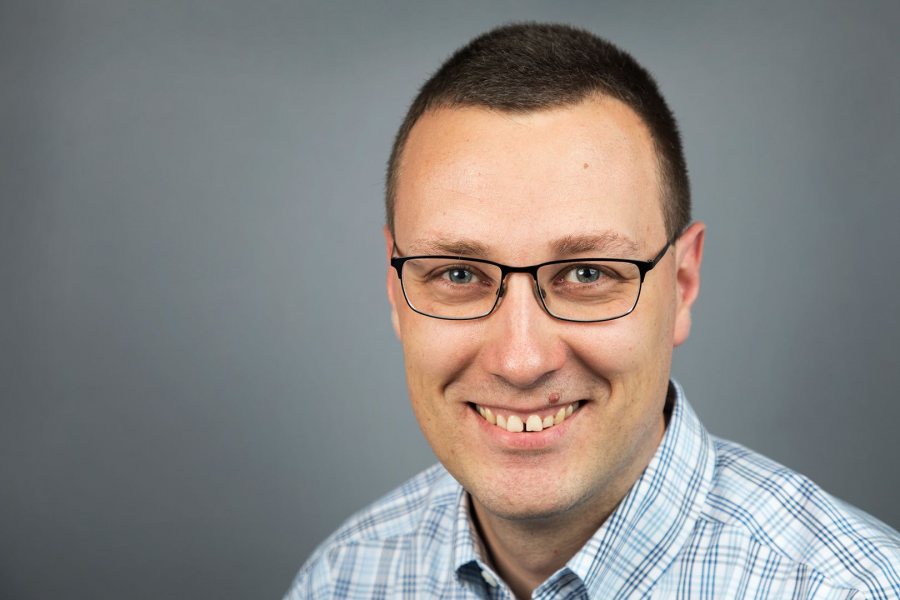
Once a volunteer firefighter in his native Germany, Martin Kruse is assistant professor of biology and neuroscience at Bates. (Theophil Syslo/Bates College)
+Geneva Laurita, Assistant Professor of Chemistry and Biochemistry
Name: Geneva Laurita
Position: Assistant Professor of Chemistry and Biochemistry
Degrees from: Oregon State University, Ph.D.
University of Northern Colorado, B.S.
Before Bates: University of California, Santa Barbara, Materials Research Laboratory, Postdoctoral Scholar
Her work: A solid-state chemist, Laurita has a particular interest in how a material’s structure relates to its behavior. Concentrating on materials with energy and electronic applications, she explores “what is the structure of a material, how do the atoms interact with one another, and how does that give rise to physical properties — for example, how does it conduct electricity or interact with light? Then we take that information to try to figure out how to manipulate atoms to drive certain properties.”
Get the lead out: In a recent project, Laurita analyzed photovoltaic materials to better understand the performance-enhancing role played by lead. “We’re interested in learning what chemistry makes lead so special, so that we can look for an alternate chemistry that would have the same properties, but without lead’s toxicity.”
Finding her path: Chemistry captivated Laurita as an undergrad. She got an opportunity to work with neutron scattering, an analytical technology, at the National Institute of Standards and Technology facility in Gaithersburg, Md. “I went there as a junior, pretty fresh-faced, but it was hugely influential,” she says. “That’s why I’m doing the science that I’m doing today.” She adds, “One of my big goals at Bates is to provide those transformative research experiences that get students excited about asking questions, doing the research, and being in the science. This is a perfect place to do that.”
The real world: “Something that really influenced me is tying my work to real-world applications,” she says. She seeks to “expose my students to why this chemistry matters. ‘We’re working on real-world problems, and we’re using the things that you’re learning today to try to solve these problems.’”
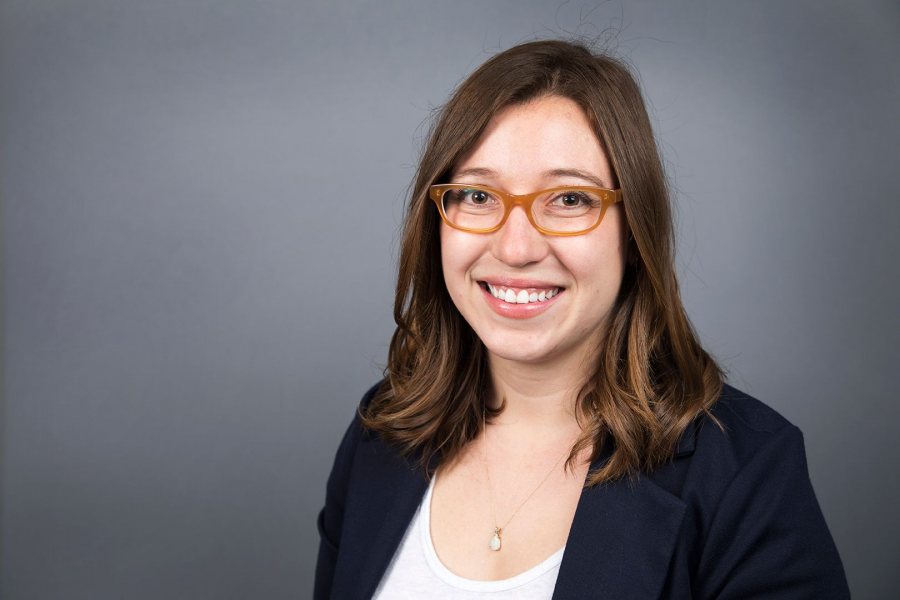
Geneva Laurita, assistant professor of chemistry and biochemistry, studies the relationships between structure and properties in solid-state materials. (Theophil Syslo/Bates College)
+Jacqueline Lyon, Lecturer in Anthropology, and Mellon Diversity and Faculty Renewal Postdoctoral Fellow
Name: Jacqueline Lyon
Position: Lecturer in Anthropology, and Mellon Diversity and Faculty Renewal Postdoctoral Fellow*
Degrees from: Florida International University, Ph.D.
DePaul University, B.A.
Her work: “Anthropology has a unique methodology that’s centered in people’s experiences and how they feel about them, what they have to say about them,” Lyon says. “Anthropology is especially suited to balancing continued engagement with communities outside the academy with scholarship and teaching.” She studies intersections of race and citizenship in Latin America and the Caribbean. Of Puerto Rican descent, Lyon says she “was looking for a way to be able to highlight the experiences of communities like my own.”
First-gen: Lyon is the first from her family to attend college. With no family experience of higher education to draw on, she was on her own when it came to understanding things like academic requirements and financial aid. Application essays presented their own insidious challenge: “I didn’t grow up in that sort of environment where you were taught to advocate for yourself or promote yourself.”
Why teach? “My best teachers pushed me and believed that I was capable of performing at a higher level than I thought I was capable of,” says Lyon. “Seeing what good mentorship looks like, what it can do, and knowing how important that has been in my own experience has compelled me to be a teacher.” But she’s also passionate about teaching “specifically about race — how students are going to confront racial issues, how they’re going to think about race, how they’re going to challenge racism.” That kind of passion is “contagious,” she says.
Why Bates? “What has been most exciting is the amount of freedom given to faculty to design and propose courses that they really care about. Also, there’s so much freedom and support for exploring different ways of teaching.”
*Mellon Diversity and Faculty Renewal Postdoctoral Fellows become tenure-track assistant professors in their second year at Bates.
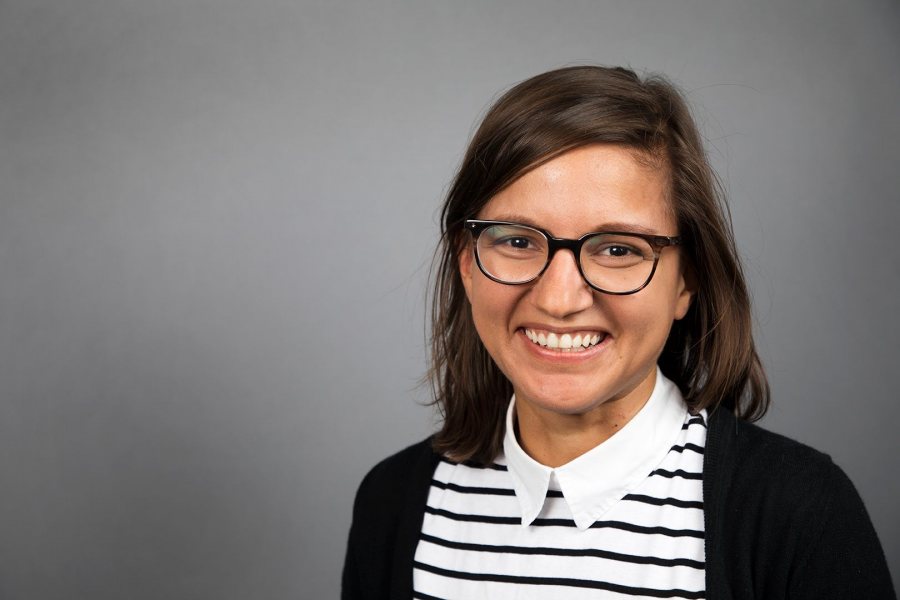
Jacqueline Lyon, a lecturer in anthropology and a Mellon Diversity and Faculty Renewal Postdoctoral Fellow, researches intersections of race and citizenship in Latin America and the Caribbean. (Theophil Syslo/Bates College)
+José Villagrana, Lecturer in English, and Mellon Diversity and Faculty Renewal Postdoctoral Fellow
Name: José Villagrana
Position: Lecturer in English, and Mellon Diversity and Faculty Renewal Postdoctoral Fellow
Degrees from: Northwestern University, B.A.
University of California, Berkeley, Ph.D.
His work: Villagrana researches 16th- and 17th-century English and Spanish literature, with a focus on apocalypticism. That is, he explores how English poets and professional writers fashion themselves as prophets, calling attention to the perceived apocalyptic threat of Spanish ethno-cultural miscegenation. “By doing so,” he explains, “they thread through lyric poetry, drama, epic — all the major literary traditions and forms of English literature — a kind of apocalyptic Hispanophobia.”
What he loves about his work: Among other things, early modern English literature is funny, Villagrana says. “We typically tend to think of this language as impenetrable and quite serious because of its archaic nature, but in actuality, it’s full of witticisms and meta-reflective material that makes it enjoyable and outright hilarious.”
The liberal arts: Prior to his hiring, Villagrana attended a 2015 conference at Bates held by the Creating Connections Consortium, a national initiative working to diversify the professoriate. As an undergraduate at Northwestern, he felt he was getting something like a liberal arts education — yet at the Bates conference, he was deeply impressed “by the mission-oriented work that Bates and its sister colleges in the consortium are undertaking, and precisely what kind of impact that has on the students. That prompted me to apply only to liberal arts colleges.”
Not your grandad’s English lit: Nowadays, Villagrana says, “students and researchers have unprecedented access to digitized records from the early modern period. I eagerly look forward to the opportunity of working with students to learn exactly what to do with this kind of knowledge. In my introductory and 200-level courses, students will be asked to do this straight away.”
*Mellon Diversity and Faculty Renewal Postdoctoral Fellows become tenure-track assistant professors in their second year at Bates.
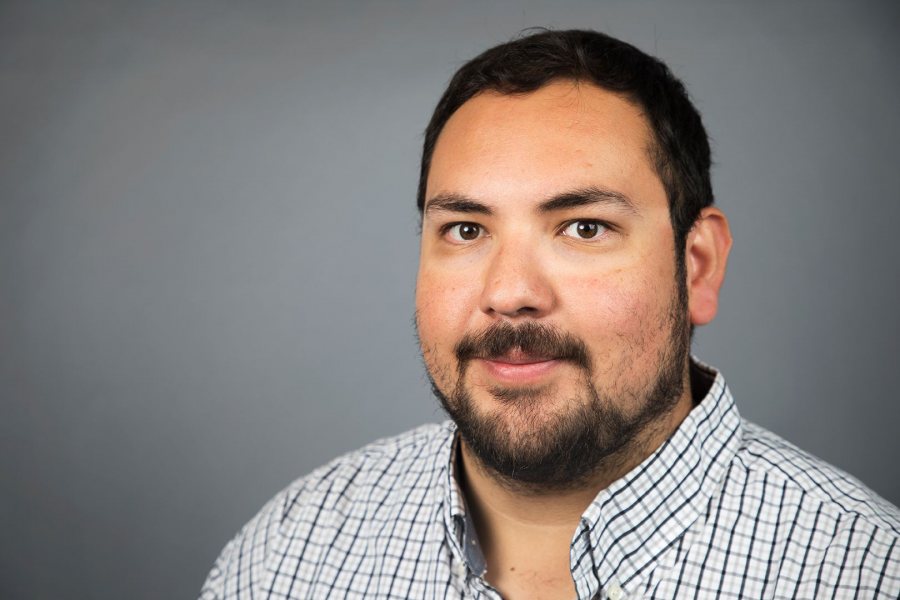
A lecturer in English and a Mellon Diversity and Faculty Renewal Postdoctoral Fellow at Bates, José Villagrana studies early modern literature of England and Spain. (Theophil Syslo/Bates College)
+Julieta Yung, Assistant Professor of Economics
Name: Julieta Yung
Position: Assistant Professor of Economics
Degrees from: University of Notre Dame, M.A. and Ph.D.
Delaware State University, B.A.
Her work: Yung studies asset prices. “In part, my research agenda seeks to understand what drives fluctuations in asset prices, how financial assets are interconnected, and their role in the transmission of shocks onto other assets as well as the macroeconomy.” For instance, one of her studies looks at the connections between the yield curves of different countries and their respective exchange rate movements.
Finding her path: Yung came to Delaware State University as a tennis player and initially was an undeclared major—she was interested in social sciences but also analytical fields like math and physics. Her first economics class lit a fire. “I realized this is where I can truly be happy because I get to learn about everything that I like in one field.”
Before Bates: After earning her doctorate, Yung became a research economist at the Federal Reserve Bank of Dallas. “Working at the Fed and being involved in policy work has given me direct exposure to the challenges that U.S. policymakers face,” she says, “shaping both my research and my analytical insight into perhaps one of the most thought-provoking economic periods of our time.”
Why study economics? “The intersection of macroeconomics and international finance is a rich area of research that allows students to answer questions at the core of social sciences from an applied and technically rigorous point of view.”
How she’ll teach: Yung says that as a student herself, her favorite courses were the ones where she learned the most. “As a teacher, my main goal is to help students develop their critical thinking and analytical skills so that they can tackle important economic questions in the classroom and beyond.”
